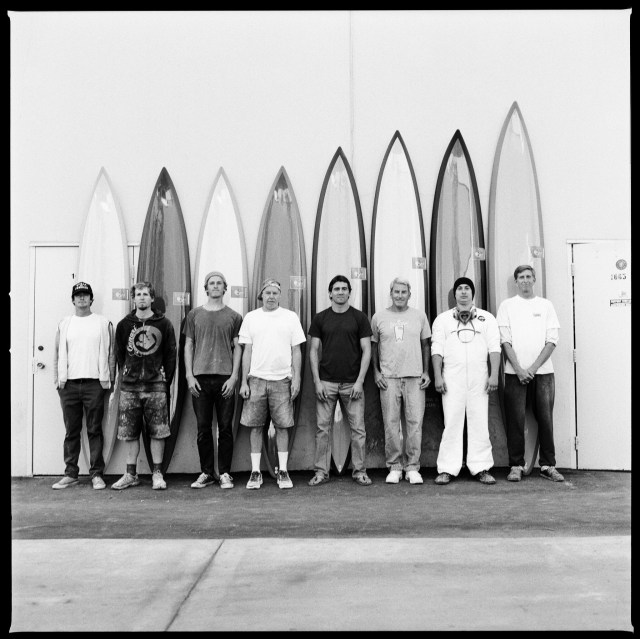Last Thursday, Chris Christenson laid off the 15 workers at his Christenson Surfboards factory in San Marcos, California. “I had to lay off my entire crew,” Christenson says. “It was hard, I’d never done anything like that in my life. But at least if I laid them off they could collect unemployment and get something.”
Christenson and staff with Greg Long, around eight years before coronavirus brought Christenson Surfboards to a screeching – albeit temporary – halt.That same day, his friend Dr. Dan Hancock, an anesthesiologist at Mission Hospital in Orange County, called Christenson to see how he was doing. “He called to check in, and I asked him what was going on with him at the hospital, whether they needed masks,” Christenson says. “I said, ‘I have a load of them, do you need them?’ And he said, ‘Yes.’”
“My group of anesthesiologists saw the writing on the wall as far as the limitations of being able to secure these masks as supplies across the country are dwindling,” says Hancock. Anesthesiologists are at particular risk of infection, as the process of inserting a breathing tube into a patient exposes them to respiratory secretions, like mucus. “We’ve been ramping up to prepare for this wave [of sick patients] that in all likelihood is going to hit us in 24, 48, 72 hours. We had to go outside of the supply chain, and reaching out to industry was a logical step.”
Christenson texted his equipment supplier, Surf Supply in Oceanside, and asked them to give any masks slated for his account to Hancock. He offered to pay for them, as did Hancock, but when Surf Supply’s Ryan Patterson read Christenson’s text describing how doctors at Mission Hospital were re-using masks for upwards of 5 days, sanitizing them, and then using them again, he drove the masks to Hancock’s house himself, free of charge. Hancock distributed them to his team, then gave the remaining to Mission Hospital’s emergency room staff.
Christenson then went to his factory and gathered the ones he had remaining there and shipped them to doctors and nurses he knew around the country, some as far as Tennessee. “I had over 100 of these masks and they weren’t going to go to use at all right now,” he says.
While surfboard factories typically utilize a variety of masks, including respirators and dust masks, the masks for healthcare workers had to be disposable, easy to talk through, able to properly fit the face with no leaks, and capable of blocking infectious particles. Dr. Hancock was after only one type of mask: the N95. These are the medical-grade masks used in hospitals, individually fit tested to ensure a proper seal, and able to stop infectious particles smaller than a micron in diameter.
Due to a nationwide shortage of N95 masks, healthcare workers are using paper masks and ones hand sewn from fabric. But these replacements can only help prevent the dissemination of infectious particles that release from a sick person when they sneeze or cough, and they perform that task inconsistently at best. They’re of little use to a healthy person trying to prevent inhalation of infectious droplets. The N95 masks are the ones that can do that, and while they’re in short supply at hospitals, they’re currently lying around many surfboard factories.
“It’s a shame that surfboard factories have more masks than hospitals,” says Christenson. “In any business, someone’s job is to supply these things. At my factory I make sure we have an abundance of gloves, masks and protective equipment. Someone’s not doing their job unfortunately, and it’s sad.”
On Friday, Christenson posted about his donation on Instagram and called on other surfboard factories to do the same. “We’re not an essential business, we are no more essential than these other non-essential businesses that have had to close,” he says. “We shouldn’t be working in my opinion, so that’s why I challenged all the other surfboard factories – yeah, donate the masks.”
At Surf Supply, Patterson was still receiving requests from factories needing more masks to continue operation. Still, he donated the vast majority of his inventory. “We’re going to be short, too, but we just decided it was better to give them to the hospitals,” says Patterson. “It was a bigger priority for us.” Patterson had some personal doctor’s appointments lined up at Kaiser hospitals in Orange County, and he arrived bearing boxes of N95 masks for each doctor he visited. The doctors were shocked. They told him that while ER doctors were being supplied with the masks, the rest of the hospital staff was left to source their own. Patterson dropped the remaining boxes at some urgent care centers nearby.
While it may be tempting to keep any extra N95 masks for personal protection, Hancock is emphatic that the best place for these masks is at the hospital. “If the doctors and nurses get sick, the whole thing falls apart,” he says. “If everyone else is doing their job to socially isolate and stay home, you don’t need a mask. You don’t need one in public if you don’t touch your face and you keep your hands clean. The people on the front lines are the ones up close and personal with the patients, they’re the ones who need them. We’re all being asked to sacrifice and take care of each other.”
Both Patterson and Christenson know that after donating most of their supplies, they’ll be at a disadvantage when business returns to normal. Christenson kept one box for his factory, enough to last his employees two-to-four weeks: “When we get back to work we’re going to need masks, and they’ll be hard to find.”
If you have any N95 masks, this article provides information on how to go about donating them.
Original Post from this site

